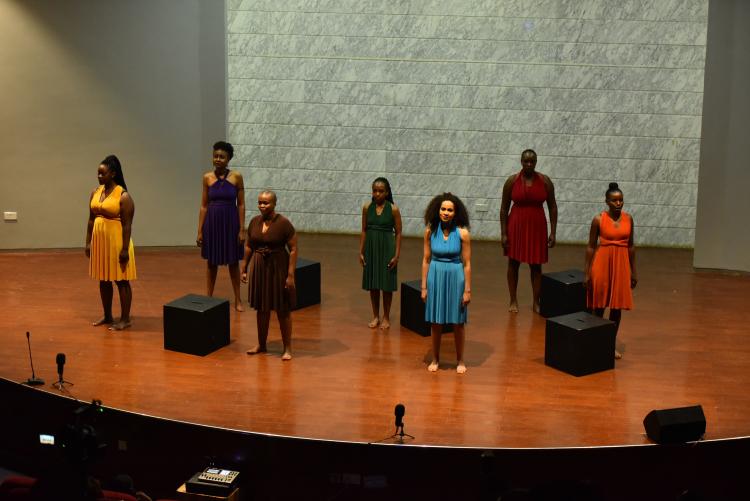END VIOLENCE AGAINST WOMEN AND GIRLS
In line with 16 Days of Activism Against Gender Based Violence. Gender Based Violence Recovery Centre (GVRC) in partnership with European Union, Embassy of Denmark Nairobi and Population Services Kenya (PSK) Project Accelerate held a one-day symposium at UoN Towers esteemed Chandaria Auditorium under the theme “Unite! Invest To End Violence Against Women and Girls”.
Gender-based violence (GBV) is an umbrella term for any harmful act that is perpetrated against a person’s will and that is based on socially ascribed differences between males and females. It includes acts that inflict physical, sexual, or mental harm or suffering threats of such acts, coercion, and other deprivations of liberty. Women and girls specifically are more likely to face Gender Based Violence (GBV)due to increased systemic barriers like access to information, finances and educational marginalization to highlight but a few.
In his remarks, Prof Julius Ogengo DV(AA)was proud to state,” Out of 42,000 students at UoN, 40% of them are girls and in some faculties, it went up to 60%. UoN is focused on gender equity and empowerment of women and girls through education and removal of systemic barriers that allow violence to thrive.
This was reiterated by Sebastian Gatimu, Planning and Coordination Specialist UN Women who said,” Disempowered Women are more likely to face GBV due to socially ascribed differences between males and females such as finances, academia, social-economic and physical capacity. There is need to holistically look at women and the psycho-social support given to GBV survivors.1% of donor funding is directed towards GBV and only 0.3% of the Kenyan budget is dedicated to GBV prevention. How much are putting aside as institutions and counties to tackle the issue of GBV?”
Ms. Dorcas Ombasa, Gender Equity Advisor expounded on how Government guidelines on GBV service took on a Survivor Centered Approach especially here in Nairobi. How training lower-level medical staff to identify GBV victims and provide safe spaces encourages victims to report cases. Linking them to specialized providers such as PoliCare and GVRC providing stakeholder coordination.
Zipporah Nderitu, PoliCare Coordinator commenting on why many GBV victims are afraid to report. Acknowledged the fact that Police and Empathy do not go well together. She said,” We are changing our attitude and the colonial mentality that made us a ‘Police Force’, we are more responsive to all issues especially GBV. We are giving victims dignified areas to report”. She was surprised that despite having a university GBV help desk equip with support staff only 10 cases had been reported this year, according to Student representative Lucy Wambui. A Victim Centered Approach is crucial for survivor’s well being
Dr. Kizzie Shako, Forensic Advisor UNODC commented on the 11 new courts taking on a Victim Centered Approach in tackling GBV survivors avoiding traumatization of victims with educated staff and legal support. She also emphasized the need to believe people when they share they have been abused or assaulted because this goes a long way in helping the person on their recovery journey. Especially taking them to hospital for the preservation of forensic evidence, which can still be collected 7 days after an ordeal. She also talked about the Criminal Sexual Offender online list where perpetrators would be published creating social awareness.
Dr. John Chege, Senior Programmes Officer GVRC reiterated,” The need to reclaim the narrative of GBV especially for survivors to heal trauma and create safe spaces for advocacy. Because the lifecycle of abuse is 3 times more likely to reoccur in unhealed trauma victims than their counterparts on their journey to recovery. This why the journey to recovery was so crucial for victims through provision of safe spaces in medical facilities, police stations, courts of law and within their communities.
Mr. Ken Otina, Masculinity Institute Kenya,” emphasized deconstruction of the term ‘a man’ because it bestowed a lot of power and responsibility on men without holding them accountable. This made men the custodians of power in intimate partner relationship making women vulnerable to violence. A fact that was reiterated by Ms. Ombasa who said,”GBV has expanded to include intimate partner assault as well as rape by instrumentation, an issue raised by Lucy Wambui.
The play ‘For Colored Girls Who Have Considered Suicide/ When the Rainbow was enough’ by Ntozake Shange and directed by Cheryl j. Williams was deftly woven into the theme and all its sub themes of Gender Based Violence. The play was vividly captivating, and its scenes and dialogue resonated with the diverse personal backgrounds of the audience. The menace that is GBV was cemented into the audience’s mind with the real testimony of Flavor Irene Karimi aka Pendo, a survivor of Gender Based Violence.

